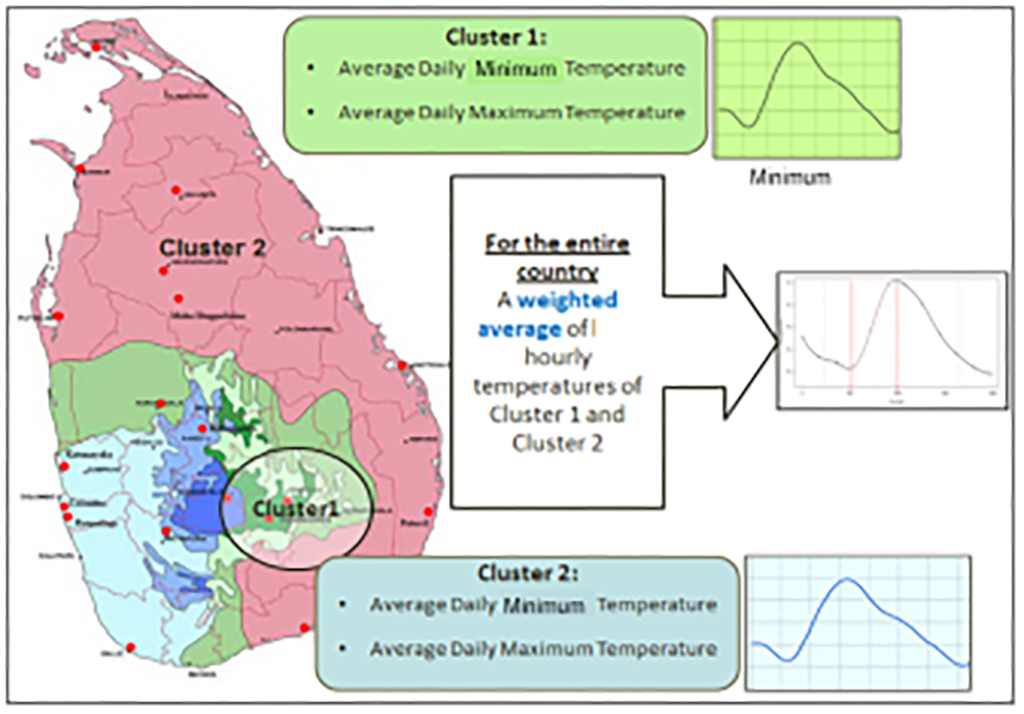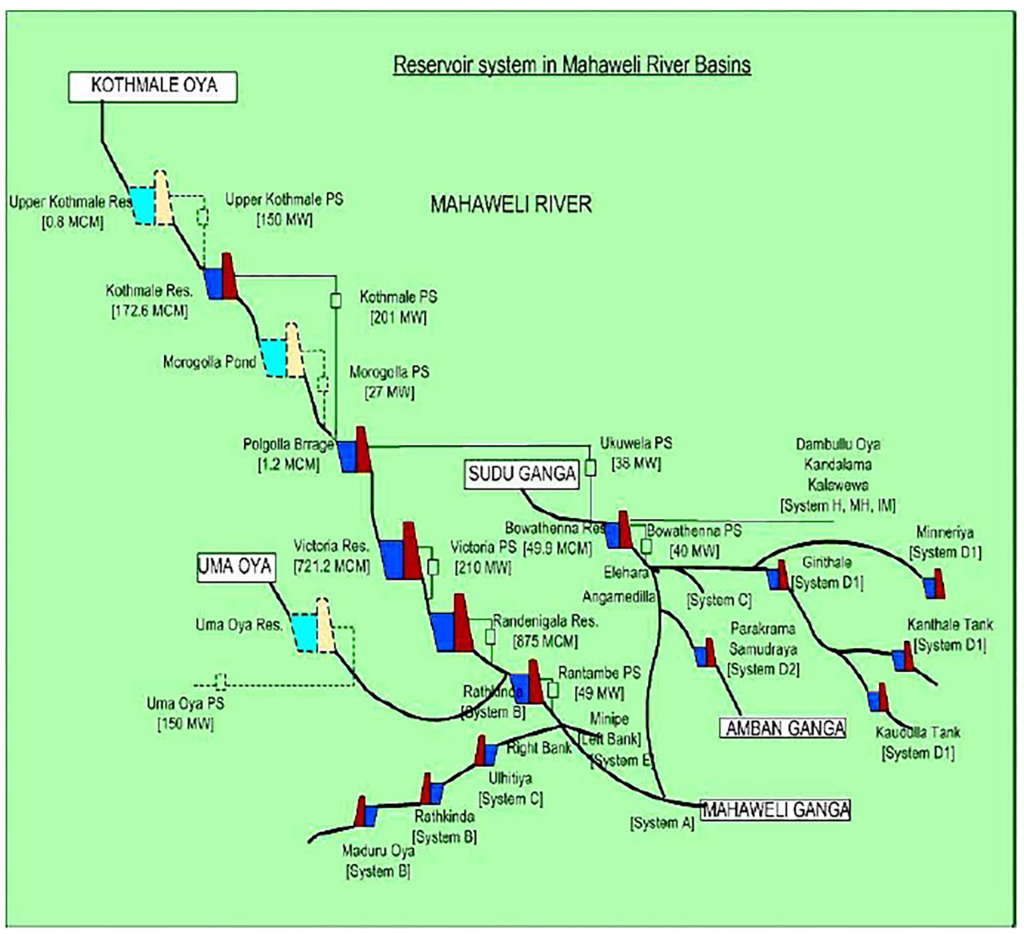Research Projects
Supply-Demand Optimisation for Cleaner and Affordable Energy Production [SDG7, SDG6, SDG10, SDG11, SDG12, SDG17] – Funded by University of Colombo

Project on enhancing Electricity Load Forecasting for Efficient Energy Generation and Distribution Management.
Traditionally, electricity load forecasting has been approached from an engineering standpoint. However, accurately predicting short-term load, such as hourly demand for the next day, can significantly improve the strategic scheduling of electricity generation options. This optimization involves maximizing the utilization of hydroelectricity, renewable energy sources, and other low-cost alternatives, leading to cost-effective and greener energy production and distribution.
Collaborative partners in this project include the Ceylon Electricity Board – System Control Centre, Transmission & Generation Planning Division, Research and Development Division, the Public Utilities Commission of Sri Lanka, the Tariffs & Economics Ministry of Finance, representatives from the CEB board, the Department of Meteorology, the University of Colombo, and Western Sydney University.
(2019) Data Driven Demand Response Modelling for Electricity Consumption in Sri Lanka (Won the National Gold Medal Award 2019 from the Institute of Applied Statistics of Sri Lanka), International Investigator
Effective Water Management in the Mahaweli Reservoir System; Analysing the Inflow of the Upmost Reservoir, International Investigator – Funded by University of Colombo
Catchment flow forecasting holds an utmost importance in a reservoir system as the operational decisions such as releasing water for hydroelectricity and agricultural requirements heavily depend on the availability of water in the up-most reservoir. Accurate forecasts of the daily catchment flow are useful for three main purposes. Firstly, prior knowledge on the volume of water available will contribute towards determining the maximum capacity of the hydroelectricity that can be generated for the following day. This will enable timely allocation of other high cost electricity generation options more effectively. Secondly, releasing the water prior to the reservoir reaching its full capacity will reduce the flood risk downstream so that enormous economical losses can be mitigated. Lastly, in situations where the catchment flow is low the next day, better management in releasing water can be done for irrigation purposes. Therefore, accurate forecasting of the daily catchment flow holds a national importance as Sri Lanka is an agricultural based country as well a country that provides electricity to almost the entire nation at an affordable cost, using hydroelectricity generation. Currently there is no strategically approached mechanism to forecast daily catchment flow in Sri Lanka. This research focuses on finding a solution to this nationally important problem and also contributes towards solving such data driven problems through new algorithms.

Collaborative partners in this project include the Mahaweli Authority of Sri Lanka, Ceylon Electricity Board – System Control Centre, Transmission & Generation Planning Division, Research and Development Division, the Public Utilities Commission of Sri Lanka, the Tariffs & Economics Ministry of Finance, representatives from the CEB board, the Department of Meteorology, the University of Colombo, and Western Sydney University.
Data-Driven Approach to Green Energy and Climate Change – Funded by WSU

Our research embarks on a mission to address the complex relationship between electricity consumption and climate change through a novel, data-driven model. Leveraging machine learning techniques like Artificial Neural Networks, Support Vector Machines, and hybrid models, we aim to forecast electricity usage changes due to weather variations and apply these insights to boost renewable energy use, thereby reducing CO2 emissions.
Spanning Australia, Pakistan, and Sri Lanka, our study analyzes electricity data from both renewable and nonrenewable sources, weather conditions, and CO2 emissions. Through metrics such as R2, MAPE, and RMSE, and more we assess the precision of our forecasting model, aiming to optimize energy consumption predictions and inform sustainable energy policies.
The research seeks to demonstrate how integrated renewable energy models can reduce waste and promote cleaner energy, offering economic and environmental benefits. The findings will guide energy and climate policy, advocating for a shift towards renewable sources and enhanced cooperation between energy and climate sectors. This initiative represents a critical step towards sustainable energy solutions and climate change mitigation.
Posters

Publications
- “Impact of temperature on the residential electricity consumption in Pakistan” 10th IEEE Computer Science and Data Engineering, 4-6 Dec 2023.
- “A meta-analysis of electricity demand forecasting system using modelling methods, factors, and horizon: A review study of Pakistan, Sri Lanka and Australia” submitted in ENERGIES (MDPI).
- “Prospective Machine Learning Techniques for Renewable Energy Modelling: A Review Study of Australia, Pakistan, and Sri Lanka”, submitted in Sustainable Energy Technologies and Assessments.
- “Hybrid modelling for efficient energy demand forecasting using Machine learning” submitted for IEEE Sustainable Power and Energy Conference (iSPEC 2024) 24-25 Nov 2024.
- Dilini, W., Attygalle, D., Liyanage, L. and Nandalal, K. (2016), ‘Ensemble forecast for monthly reservoir inflow: a dynamic neural network approach’, International Conference on Operations Research and Statistics, Singapore.
- Rana, M., Rahman, A., Liyanage, L. and Uddin, M. (2018), ‘Comparison and sensitivity analysis of methods for solar PV power prediction’, Pacific-Asia Conference on Knowledge Discovery and Data Mining, Melbourne, Vic.
- Basnayake, W., Attygalle, D., Liyanage, L. and Nandalal, K. (2017), ‘Cluster based modular nonlinear autoregressive neural network to predict daily reservoir inflow’, International Conference on Advances in ICT for Emerging Regions, Colombo, Sri Lanka.
- Basnayake, W., Attygalle, D., Liyanage, L. and Nandalal, K. (2017), ‘Grid search-based parameter tuning of dynamic neural network to forecast daily reservoir inflow’, International Conference on Computational Modelling and Simulation, Sri Lanka.
- Deshani, K., Attygalle, D., Liyanage, L. and Lakraj, G. (2017), ‘Dynamic short-term load forecasting using functional principal component regression’, International Conference on Machine Learning and Data Engineering, Western Sydney University (Parramatta Campus).
- Basnayake, W., Attygalle, D., Liyanage, L. and Nandalal, K. (2017), ‘Wavelet based nonlinear autoregressive neural network to predict daily reservoir inflow’, International Conference on Machine Learning and Data Engineering, Western Sydney University (Parramatta Campus).
- Deshani, K., Attygalle, M. and Liyanage, L. (2016), ‘Diurnal temperature modelling with sparse data and data integration’, International Conference on Operations Research and Statistics, Singapore.
- Deshani, K., Attygalle, D. and Liyanage, L. (2016), ‘Incorporating influential factors in diurnal temperature estimation with sparse data’, GSTF Journal of Mathematics, Statistics and Operations Research, vol 3, no 2, pp 63 – 67.
- Deshani, K., Attygalle, M., Liyanage, L. and Karunaratne, A. (2014), ‘An exploratory analysis on half-hourly electricity load patterns leading to higher performances in neural network predictions’, International Journal of Artificial Intelligence and Applications, vol 5, no 3 , pp 37 – 51.
- Dilini, W., Liyanage, L., Attygalle, M. and Nandalal, K. (2014), ‘Effective water management in the Mahaweli reservoir system: analysing the inflow of the upmost reservoir’, International Symposium for Next Generation Infrastructure, Wollongong, NSW.
- Deshani, K., Liyanage, L., Attygalle, M. and Karunaratne, A. (2014), ‘A study of the dynamic behaviour of daily load curve for short term predictions’, International Symposium for Next Generation Infrastructure, Wollongong, NSW
- Deshani, K., Liyanage, L., Attygalle, M. and Karunaratne, A. (2014), ‘Improved neural network prediction performances of electricity demand : modifying inputs through clustering’, International Conference of Data Base and Data Mining (DBDM-2014), Dubai, United Arab Emirates.
